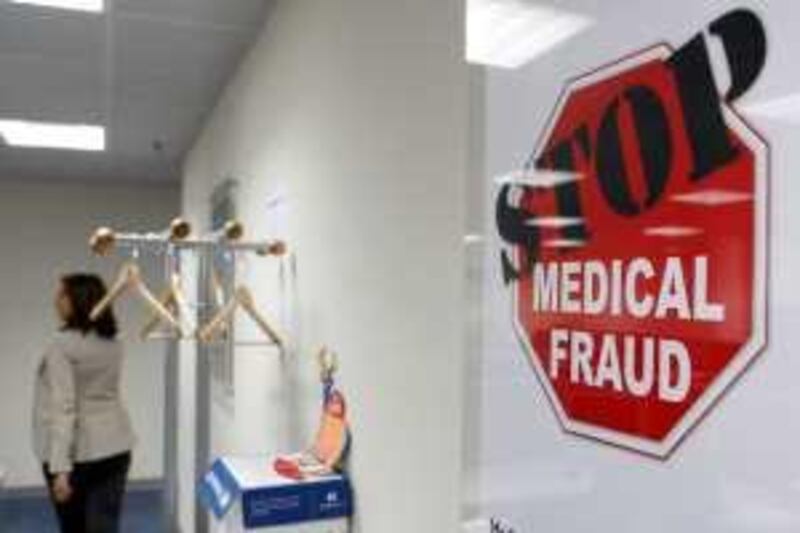DUBAI // So-called "mystery shoppers" have discovered several cases of suspected insurance fraud at Dubai hospitals and clinics over the past nine months. The Dubai Health Authority (DHA) started using undercover employees to monitor the Enaya insurance programme, which was established to serve the government's 100,000 employees and their families, after it was launched last June.
Dr Haidar al Yousuf, the DHA's director of funding, did not specify the number of frauds exposed, saying there were a few "isolated" incidents. But he described one case in which a doctor allegedly tried to convince a patient to have an apparently unnecessary surgery that was not covered under the plan. "Health insurance fraud occurs all over the world, and is not unique only to us," Dr al Yousuf said. "We have three or four lines of defence that we use to monitor the situation, one of which is utilising our own employees as mystery shoppers.
The DHA staff also monitor prescription claims for any evidence that unnecessary drugs are being dispensed and are on the watch for any other irregularities on the part of doctors or hospitals, said Dr al Yousuf, who is also the head of the health sector accountability and performance at the DHA. The doctor who tried to convince a patient to have surgery not covered by Enaya falsified the patient's symptoms and medical history, gave a false diagnosis, and ordered expensive pre-operation investigations, knowing that the full operation could not be approved by the insurance policy.
"For a physician to change diagnosis to get an OK was a unique case," he said. "We want to make sure no bad habits take root from the very beginning. The concept of insurance is still fairly new in the region and Enaya is a very new programme, so it needs to be nurtured and providers must not abuse it." Some patients also make fraudulent claims, Dr al Yousuf said. They fake symptoms to obtain prescriptions for other people, such as relatives, posing "serious health risks" to those receiving medicine without a doctor's supervision, he said.
Once a fraud is discovered, the DHA has a range of punitive measures at its disposal, from issuing a warning letter to revoking a licence or temporarily closing a facility. "Some cases are even referred to a committee that may decide to pursue legal action," Dr al Yousuf said. "We decide on a case-by-case basis. We encourage physicians to do what's right for the patient - no more and no less - in order to build a medically correct culture."
In January, 39 patients, doctors and insurance companies were taken to court by the Health Authority-Abu Dhabi for offences that included making fraudulent claims, using fake insurance cards and charging for services that were not provided. Daman, the country's largest health insurer, which insures some 80 per cent of people in the market, said last year that it processed just under 200,000 false claims annually.
These included fake medical tests and prescriptions written by doctors and pharmacists. In 2009, it reclaimed Dh6 million from clinics for bogus treatments. @Email:hkhalaf@thenational.ae





